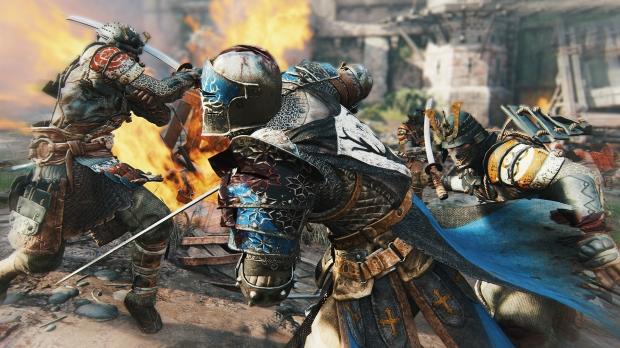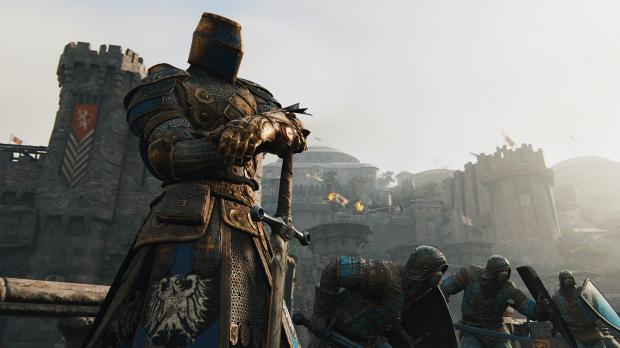Ubisoft's latest game For Honor perfectly encapsulates the industry giant's total gameplan: combining triple-A buy to play fees with online-only gameplay for instant updates and changes and microtransactions for recurring profits. Despite all this, For Honor is peer-to-peer based and has no dedicated servers.

In many ways For Honor really shows how much Ubisoft has learned with The Division: solid gameplay mechanics, more balanced microtransactions to keep things feeling more fair, and a unique competitive element that combines perfectly with mechanics to create something rather distinct.
Make no mistake, however: with its recurring microtransactions, online-based gaming, premium $59.99 cost, strong MAU (monthly active user) engagement driven by new updates, For Honor is a total representation of how Ubisoft makes its money, and copies strategies used with Rainbow Six: Siege and The Division. In many ways For Honor is a vehicle for these strategies.
Like the samurai and knights in For Honor, Ubisoft has honed their blades and sharpened their skills.
As a result of this magical formula of recurring player spending, full game price tag, and heavy engagement thanks to its online-only feature, Ubisoft expects For Honor to be a strong contributor to its estimated $679 - $721.9 million fourth quarter FY2017 earnings, pushing total yearly earnings to $1.57 billion USD.
But The Division and Rainbow Six: Siege have something For Honor doesn't have: dedicated servers.
Despite the fact that For Honor can only be played online, the game relies on peer-to-peer networking instead of dedicated servers. This can lead to a shaky foundation where connectivity issues run rampant. This kind of connectivity can be quite punishing in competitive PVP games.
"We can confirm that For Honor is an always online experience. Some elements of progression, which is hosted online, are shared across story and multiplayer modes. Players will need to be connected to the Internet at all times to play For Honor," an Ubisoft rep confirmed.
Here we have a $59.99 online-only game built on peer-to-peer networking with up to $100 microtransactions and we still don't get dedicated servers. As for how bad the microtransactions are, we're still investigating the full cost of the game's MTX, so keep a look out for more coverage.
So why would Ubisoft take out a key part of their money-printing formula to the detriment of the playerbase and directly jeopardize MAU and engagement levels? If the network starts acting up gamers will jump ship and stop playing.
The answer is simple: money.
(Cont. below)
Ubisoft's current business model is based on a three-year plan that incorporates all of its best money-making strategies into one unified goal. Like I've said above, we've seen this manifest clearly with Rainbow Six: Siege, The Division, and now For Honor--and Ubisoft will continue pushing online-based gaming, MTX, etc.
Another part of this strategy is "tight cost control," which means Ubisoft will likely be a lot less likely to spend money where it feels it doesn't need to--ie completely overhauling a game's network structure.
Adding dedicated servers to a game that's already built on P2P networking is no easy feat. This would cost Ubisoft quite a bit of money and players would have to drop left and right before the company decided to do something.
"We are successfully pursuing our transformation into a more recurring and more profitable profile. The positive effects of this transformation are remarkable. They illustrate how far ahead of schedule we are in our digital development, which is one key element of our three-year targets."
"In light of the positive impacts of our transformation, combined with our overall solid performance and tight cost control, we are standing by our objective of achieving record operating income and operating margin for fiscal 2016-17, despite lower-than-expected sales."
Interestingly enough this isn't the first time that Ubisoft games have had serious problems with networking. The Division used to be overrun with hacks, glitches and exploits and took considerable time, money and tweaking on Ubisoft's part to fix.
One dev even said that The Division couldn't really ever be fixed without completely rewriting the game's network code.
(Cont. below)

The future of Ubisoft games
This business model will absolutely invade future Ubisoft games. In fact, Ubisoft has already planned out its fiscal projections for 2018 - 2019 (FY19), meaning the publisher is already quite confident in next year's development pipeline. This period will see the completion of its three-year plan, and based on how much Ubi is earning so far, I'm quite confident they'll extend the plan well beyond 2019.
Expect to see microtransactions in all online-based games or titles with any kind of network connectivity or multiplayer features. Expect to see more season passes and MTX justify the "free" DLC offered by developers in online games. Most of all, however, expect to see more fully-priced games that come with in-game purchases.
This formula is really rather simple and its all about:
- Full-priced digital/physical game sales
- Microtransactions and recurring player investment/spending
- Monthly Active Users (MAU) to gauge how popular something is (when MAU drops Ubisoft will release a DLC/update strategically timed to pull gamers back in)
- Engagement to make sure players spread the word to their friends and continue playing


